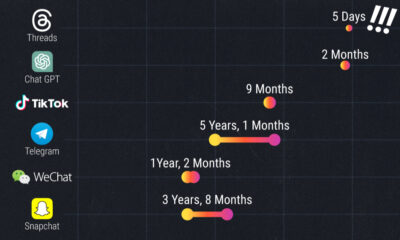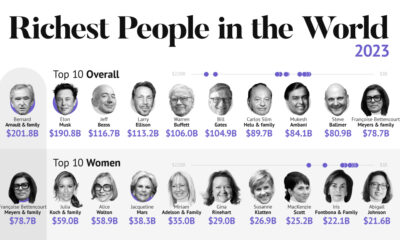Technology
Meet the Competing Apps Battling for Twitter’s Market Share
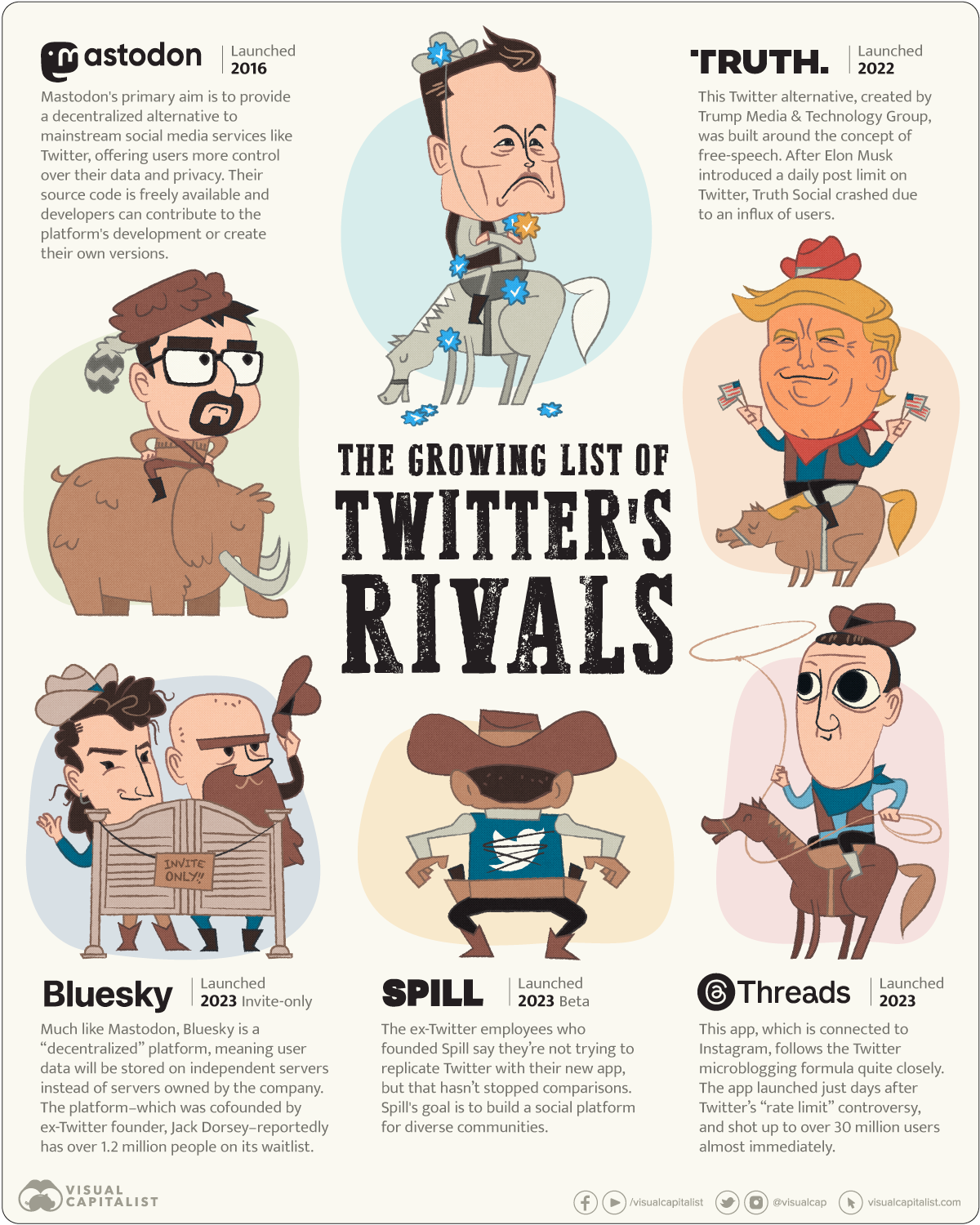
Meet the Competing Apps Battling for Twitter’s Market Share
The Twitterverse is under siege as a flurry of microblogging platforms, keen to capitalize on simmering discontent, vie for its vast user base. Among the most serious contenders are five apps offering diverse solutions, each with their unique appeal.
Five Twitter Alternatives
At the top of the list is Meta’s Threads, a fresh entrant that leverages the success and massive userbase of Instagram. Launched hot on the heels of Twitter’s controversial ‘rate limit’ decision in June 2023, Threads emulates Twitter’s microblogging approach with an Instagram twist. The new kid on the block swiftly amassed over 30 million users on its launch day, posing a credible threat to Twitter’s dominance.
Meanwhile, the decentralized platform Mastodon, which has been running since 2016, continues to challenge the status quo. Its open-source model enables user control over data and privacy, providing an alternative to mainstream social media monopolies. Mastodon saw a big surge in users last year as Elon Musk took control of Twitter—a move that was wildly unpopular with a subset of users.
Another decentralized contender is BlueSky, a brainchild of Twitter co-founder Jack Dorsey. Still in its nascent ‘invite-only’ stage, BlueSky already has a whopping 1.2 million potential users on its waitlist, a testament to its potential to disrupt the social media landscape.
Spill, co-founded by former Twitter employees, is also shaking things up. The platform aims to foster diverse communities rather than mimic Twitter, but the similarities are hard to overlook. Impressively, even though Spill is still invite-only, it has become one of the most downloaded apps on Apple’s App Store.
Lastly, there’s Truth Social, a product of Trump Media & Technology Group. It bills itself as a bastion of free speech. In the aftermath of Twitter’s introduction of a daily post limit by Elon Musk, Truth Social’s servers were overwhelmed by an influx of users seeking an unrestricted social media experience.
As these platforms fight for Twitter’s turf, only time will tell who’ll come out on top. Twitter’s rule remains challenged, but the battle for social media supremacy is far from over.
apps
How Long it Took for Popular Apps to Reach 100 Million Users
Threads reached 100 million users in just five days. Here is a timeline of how long other popular platforms took to reach the milestone.
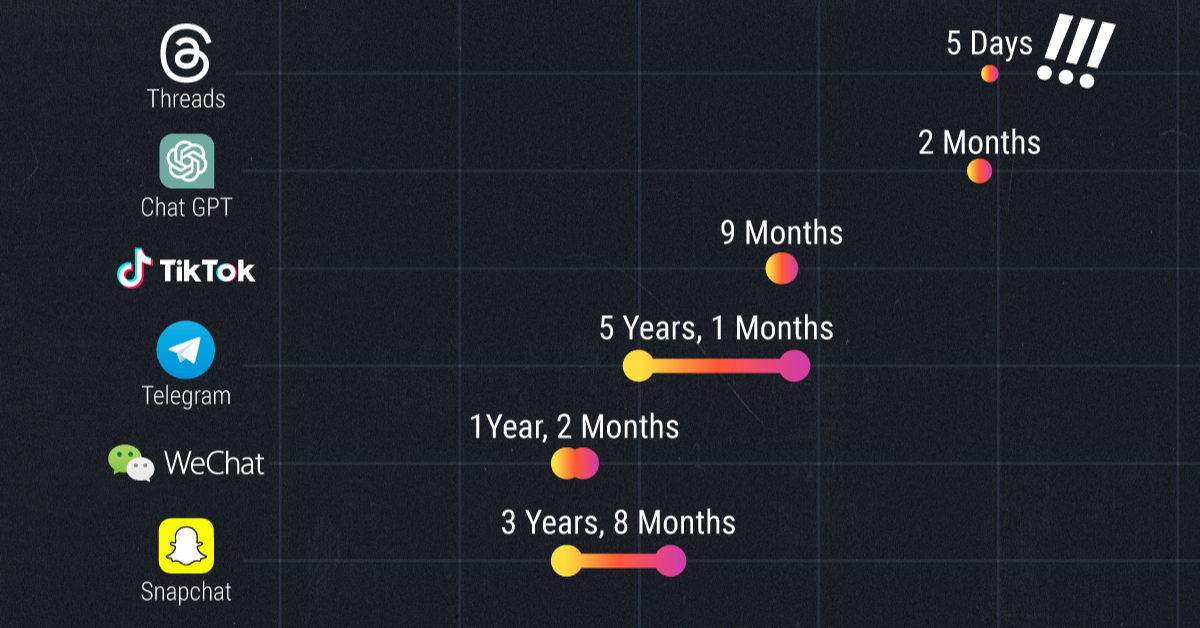
How Long it Took for Popular Apps to Reach 100 Million Users
Of Twitter’s many new rivals, Meta’s newest social media platform Threads has established its presence with a bang.
According to Meta founder Mark Zuckerberg, Threads took only 5 days to reach the key threshold of 100 million users. It achieved this milestone through organic demand—and no paid promotions required—smashing all previous records.
But how long have other popular platforms—TikTok, Instagram, and YouTube to name a few—taken to build their user base? Pulling data from PwC and Yahoo, we rank how long it took popular platforms to get to 100 million users.
Ranking Every Apps Journey to 100 Million Users
In first place, Threads has a significant lead over the rest of the pack with its five day achievement, and may have built a significant moat in holding on to this record.
Firstly, its launch coincided with Twitter’s viewing limit decision, and rode the wave of dissatisfaction aimed at Twitter’s current owner, Elon Musk.
Secondly, new users on Threads need an Instagram account to register, thus eliminating sign-up barriers and leveraging Instagram’s 1.2 billion-strong user base.
Here’s the journey length of popular platforms to attaining 100 million users:
| Rank | Platform | Launch | Time to 100M Users |
|---|---|---|---|
| 1 | Threads | 2023 | 5 days |
| 2 | ChatGPT | 2022 | 2 months |
| 3 | TikTok | 2017 | 9 months |
| 4 | 2011 | 1 year, 2 months | |
| 5 | 2010 | 2 years, 6 months | |
| 6 | Myspace | 2003 | 3 years |
| 7 | 2009 | 3 years, 6 months | |
| 8 | Snapchat | 2011 | 3 years, 8 months |
| 9 | YouTube | 2005 | 4 years, 1 month |
| 10 | 2004 | 4 years, 6 months | |
| 11 | Spotify | 2006 | 4 years, 7 months |
| 12 | Telegram | 2013 | 5 years, 1 month |
| 13 | 2006 | 5 years, 5 months | |
| 14 | Uber | 2011 | 5 years, 10 months |
| 15 | 2010 | 5 years, 11 months | |
| 16 | Google Translate | 2006 | 6 years, 6 months |
| 17 | World Wide Web | 1991 | 7 years |
| 18 | 2003 | 7 years, 11 months |
Ranked second, Open AI’s ChatGPT launched in November 2022 and hit 100 million users by the start of the new year. ChatGPT introduced the incredible capabilities of large language models to the masses, prompting a rush of sign-ups, and reviving old conversations around the potential consequences of AI.
Coming in at third place, ByteDance’s TikTok took just 9 months to reach 100 million users after its launch in 2017. Like Threads, TikTok benefited from another app, accessing popular lip syncing app Musical.ly’s existing user base after it was acquired and folded into TikTok.
WeChat and Instagram round out the top-five, also with interesting advantages. WeChat, an instant messaging platform similar to WhatsApp, benefited from its unique access to China’s notoriously closed internet market of 500 million users in 2012.
Meanwhile, Meta acquired Instagram when the photo-sharing platform had 30 million users, and more than tripled that number past 100 million in just one year.
And while Facebook ranks solidly middle-of-the-pack for fastest to 100 million users, it remains the platform with the most monthly active accounts, at nearly 3 billion. In fact, Meta’s lessons learned from Facebook have been well-leveraged, and the company owns 4 of the fastest apps to register 100 million users.
So What Does Threads Success Mean for Twitter?
Coming back to Threads’ incredible feat, however, it’s still early days whether an en-masse switch from Twitter is on the cards for Meta’s newest platform.
For one, Threads has faced significant criticism due to its intensive data collection practices and lack of accessibility features. It also is missing some key features from its rival, including trending topics, hashtags, and direct messages.
Meanwhile Elon Musk has been less than pleased with Threads’ success, deeming it a copy of Twitter and even threatening legal action.
Competition is fine, cheating is not
— Elon Musk (@elonmusk) July 6, 2023
So where does this leave the increasingly-crowded social media space? The next decade will set the stage for either more platform consolidation, or even further audience fragmentation.
-

 VC+4 days ago
VC+4 days agoWhat’s New on VC+ in July
-

 Datastream4 weeks ago
Datastream4 weeks agoCan You Calculate Your Daily Carbon Footprint?
-
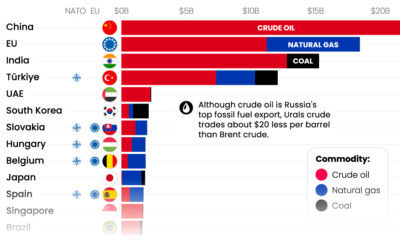
 Energy2 weeks ago
Energy2 weeks agoWho’s Still Buying Russian Fossil Fuels in 2023?
-
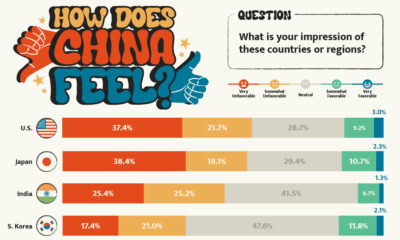
 China13 hours ago
China13 hours agoHow Do Chinese Citizens Feel About Other Countries?
-

 Markets4 weeks ago
Markets4 weeks agoVisualizing BlackRock’s Top Equity Holdings
-

 Markets2 weeks ago
Markets2 weeks agoVisualizing 1 Billion Square Feet of Empty Office Space
-

 Markets4 weeks ago
Markets4 weeks agoVisualizing Every Company on the S&P 500 Index
-

 Maps2 weeks ago
Maps2 weeks agoVintage Viz: The World’s Rivers and Lakes, Organized Neatly



